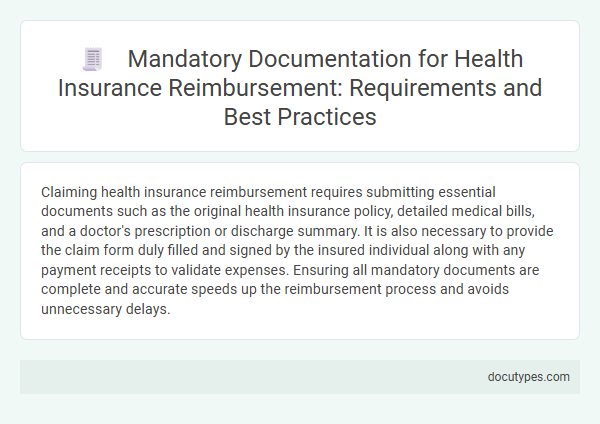Claiming health insurance reimbursement requires submitting essential documents such as the original health insurance policy, detailed medical bills, and a doctor's prescription or discharge summary. It is also necessary to provide the claim form duly filled and signed by the insured individual along with any payment receipts to validate expenses. Ensuring all mandatory documents are complete and accurate speeds up the reimbursement process and avoids unnecessary delays.
Introduction to Health Insurance Reimbursement
Health insurance reimbursement is a process where policyholders are compensated for medical expenses incurred. Understanding the required documents is crucial for a smooth and timely claim settlement.
Essential documents include the original health insurance policy, medical prescriptions, and detailed hospital bills. A claim form filled out by the insured or the medical provider is also necessary. These documents collectively ensure verification and approval of the reimbursement request.
Importance of Mandatory Documentation
Proper documentation is essential for smooth processing of health insurance reimbursements. Missing or incorrect documents can delay or even result in claim rejection.
- Medical Bills and Receipts - These documents verify the expenses incurred during treatment and are crucial for claim approval.
- Doctor's Prescription and Discharge Summary - They provide details about the medical condition and treatment, supporting the validity of the claim.
- Insurance Claim Form - Filling out this form accurately is mandatory to initiate the reimbursement process with your insurer.
Key Documents Required for Reimbursement
Submitting the correct documents is essential for a smooth health insurance reimbursement process. Key documents include the original medical bills and detailed discharge summary from the hospital.
Receipts for prescribed medicines and diagnostic test reports must also be provided. A valid health insurance policy document and a duly filled claim form are mandatory for processing reimbursement claims.
Policyholder Identification Requirements
| Document Type | Description | Purpose |
|---|---|---|
| Policyholder Identification Proof | Official government-issued ID such as a passport, driver's license, or national ID card. | Confirms the identity of the policyholder to verify entitlement to the health insurance benefits. |
| Insurance Policy Document | The original or a copy of the health insurance policy certificate. | Provides policy details including coverage and policyholder information necessary for reimbursement processing. |
| Claim Form | Completed and signed reimbursement claim form as issued by the insurer. | Formally initiates the reimbursement request and contains essential personal and policy details. |
| Medical Bills and Prescriptions | Original bills, invoices, and prescriptions related to the health treatment covered under the policy. | Serves as proof of medical expenses incurred, required for verifying claim validity. |
You must provide valid policyholder identification documents to ensure smooth verification and reimbursement of your health insurance claims. These identification requirements help protect against fraud and confirm your eligibility for benefits.
Medical Reports and Prescription Details
Which documents are mandatory for health insurance reimbursement related to medical reports and prescription details? Medical reports must be comprehensive, detailing diagnosis, treatment, and progress. Prescription details should clearly specify medications, dosages, and prescribing doctor's information for claim approval.
Hospitalization and Treatment Records
Hospitalization and treatment records are essential documents required for health insurance reimbursement claims. These records provide detailed information about the medical procedures, duration of stay, and treatments administered during the hospital visit.
Submission of discharge summaries, hospital bills, and medical reports ensures accurate processing of the claim. Insurers rely on these documents to verify the legitimacy and extent of the healthcare services provided.
Itemized Billing and Payment Receipts
For health insurance reimbursement, submitting the correct documentation is crucial to ensure your claim is processed without delays. Itemized billing and payment receipts are among the essential documents required by insurance providers.
- Itemized Billing - Provides a detailed breakdown of medical services and treatments received, including individual costs for transparency.
- Payment Receipts - Serve as proof that the medical expenses were paid by you, confirming the legitimacy of the claim.
- Compliance with Policy Requirements - Ensuring these documents are accurate and complete helps prevent claim rejection or processing delays.
Submitting both itemized billing and payment receipts accurately supports a smooth reimbursement process for your health insurance claim.
Common Documentation Mistakes to Avoid
Health insurance reimbursement requires submitting specific documents such as the original medical bills, detailed prescriptions, and a duly filled claim form. Common documentation mistakes include submitting photocopies instead of originals, incomplete forms, and missing signatures that can delay the reimbursement process. Ensure your documents are accurate and complete to avoid claim rejections and expedite your refund.
Best Practices for Timely Claims Processing
Submitting the correct documents is essential for health insurance reimbursement, including the claim form, medical bills, and doctor's prescriptions. Maintaining organized records such as discharge summaries, pharmacy receipts, and diagnostic reports enhances the claim's accuracy and reduces processing delays. Timely submission of these documents according to insurer guidelines ensures faster claim approval and efficient reimbursement.
Which Documents Are Mandatory for Health Insurance Reimbursement? Infographic

